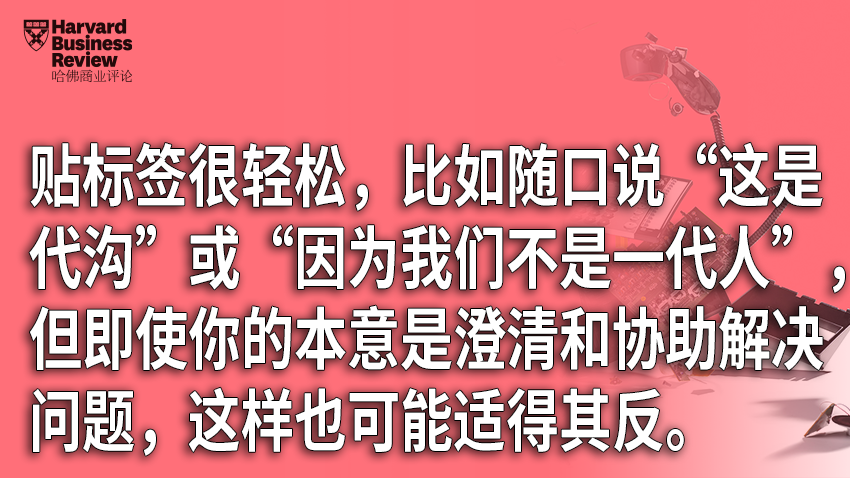Is That Conflict with Your Colleague Really About Age Difference?

你注意到一种令人沮丧的模式。与年长同事开会的时候,他们似乎不会关注你提出的观点。你怀疑他们趁你发言的时候检查电子邮件,而且他们很少认可你的提议。你想到他们针对与你年纪相仿的其他同事的轻蔑评论,觉得他们不认真对待你是因为你年轻。
You’ve noticed a frustrating pattern. During meetings with an older colleague, they seem to tune out any time you offer an idea. You suspect they’re checking email when you’re speaking, and they rarely, if ever, acknowledge your suggestions. Given dismissive comments they’ve made about other employees around your age, you assume they’re not taking you seriously because you’re younger than they are.
或者反过来:你看到一名年轻同事在Zoom会议中翻白眼——似乎就是针对你分享的相关经验。对方可能是针对其他人的,但你忍不住觉得这位同事嫌弃你固执己见、故意表现得不尊重。
Or perhaps the situation is reversed: You’ve caught a younger colleague rolling their eyes on group Zoom calls — seemingly whenever you’re sharing experience with the topic at hand. The gesture could be aimed at someone else, but you can’t help feeling like the colleague sees you as stuck in your ways and is acting disrespectfully on purpose.
但你怎么能确定自己和同事之间的问题属于代际冲突?如果的确是,那么该如何应对?
But how can you be sure that what’s happening between you and your coworker is a generational conflict? And if it is, how should you address it?
现在的工作场所中有五代人共事,人们很容易陷入代际冲突和刻板印象:
With as many as five generations working side by side in organizations, it’s easy to get caught up in generational conflicts and stereotypes:
- 婴儿潮一代傲慢不理人
- X世代冷漠偏激
- 千禧一代自视甚高
- Z世代自恋且不愿辛苦工作
- Boomers are out of touch and arrogant.
- Gen Xers are cynical and disengaged.
- Millennials are entitled.
- Gen Zers are narcissistic and don’t want to work hard.
假如这些刻板印象全部属实,那么大部分公司什么都做不了。说到底,有人愿意跟上面说的这种人一起工作吗?然而刻板印象不必属实,也能制造冲突。在一定程度上相信这类刻板印象、预设特定年龄层的某位同事符合相应的刻板印象,可能会让你与同事的关系产生裂痕。
If these stereotypes were all true, little would get done in most companies. After all, who wants to work with people who have any of these attributes? But stereotypes don’t have to be true to create conflicts. Believing these things anyway — assuming that a colleague from a particular generation is a certain way — can cause rifts with our coworkers.
刻板印象在另一个层面也可能导致矛盾。如果我们预设年长同事或年轻同事对自己怀有相应年龄层的刻板印象,就容易发生不愉快的摩擦。研究者称之为元刻板印象,即“我们自己觉得别人根据我们的年龄层预设的刻板印象”。
There’s another layer that adds to the potential strain. If we assume that our older or younger colleagues believe these things about us, we may be setting ourselves up for unpleasant clashes. Researchers call these meta-stereotypes, or “what we think others believe about us based on our age group.”
归根结底,没有多少证据能表明不同世代的人在工作中的行为或者对职业生涯的追求有什么显著的不同。举例来说,研究发现,无论属于哪个世代,20岁的人表现得都像20岁。而且虽然人们都在感叹自己年龄渐长、职位越高,一切都会变,但“现在的孩子”比过去的年轻人更糟糕的看法纯属幻觉。
Ultimately, there is little evidence that people of different generations behave markedly differently from each other at work or want markedly different things from their careers. Research has found, for example, that 20-year-olds tend to behave like 20-year-olds, no matter what generation they’re in. And while it’s common for people to lament how things have changed as they get older and more senior in their careers, the belief that “kids these days” are worse than young people in the past is more of an illusion than a reality.
而不同世代的人彼此对其他世代的看法在互动中造成的矛盾并不是幻觉。你觉得被评判了,他们觉得被评判了。那么,如果同事不公平的预设造成了矛盾,或者使矛盾升级,你该怎么办?有几种策略可以帮助你避免不假思索的本能反应,改善与同事的关系。
What isn’t an illusion is the tension that beliefs about other generations — both yours and your colleagues’ — create in your interactions. You feel judged, they feel judged. So what do you do if you’re stuck in a conflict that has been created or exacerbated by a colleague’s unfair assumptions? There are a few tactics you can use to avoid knee-jerk responses and improve your working relationships.
对自己和对方的回应保持好奇
Be curious about your response — and theirs
如果工作上出了问题,比如某位年轻同事没能赶上任务截止期限、导致一个重要项目推迟,我们会自行构造一整套解释。这种解释充满个人情绪和批判,虽然可能只是臆想,却让我们自己坚信不疑,因为其根基正是我们的大脑试图理解这件事做出的可能有瑕疵的推断,不是现实。大脑会为了节省资源而草率地判断状况,做出反应。科学家称之为不成熟的认知共识(premature cognitive commitment)。
When something goes wrong at work — say, a young colleague misses a deadline, causing an important project to be delayed — we tell ourselves a story about what’s occurring, why, and what will happen next. And these stories, laden with emotions and critiques, feel truthful to us even when they may not be, because they’re based on our brain’s sometimes-flawed sensemaking attempts rather than on facts. In an effort to conserve resources, our brains make snap judgments about what’s going on and how we should react. Scientists call it premature cognitive commitment.
也许你会预设年轻同事没能按时完成工作是因为二十几岁的人不像你一样认真对待工作。不要坚持这种想法,后退一步问问自己,还有什么别的可能。可以参考以下问题:
Maybe you assume that your colleague didn’t get their work done on time because they’re a 20-something who doesn’t take work as seriously as you do. Instead of sticking with that story, take a step back and ask yourself what else might be going on. Here are some questions you can start with:
- 我的理解有没有可能是错的?
- 我对同事或现状做出了什么预设?
- 我们之间的问题会不会是因为我?
- 除了年龄或世代以外有什么别的因素可以解释对方的行为?
- Is it possible that my interpretation is wrong?
- What assumptions have I made about my colleague or the situation?
- How have I possibly contributed to the problem between us?
- Other than this person’s age or generation, what else could explain their behavior?
最后一个问题很重要,因为有一种叫作基本归因错误的认知偏见,即观察另一个人的行为并更多地归因于性格而非环境的倾向。由于这种偏见,你可能会告诉自己,项目推迟是因为同事不用心,其实可能是因为同事忙于应对家庭危机,或者太忙了,但你并不知道。有趣的是,假如换成自己,我们的行为就会反过来:如果你自己没有赶上项目截止期限,就会关注各种原因,不会考虑自己所在的世代被视为不认真工作这件事。
That last question is important because of a cognitive bias called fundamental attribution error — the inclination to observe another person’s behavior and assume it has more to do with their personality than with their circumstances. That’s why you might tell yourself the project delay was a result of your colleague’s lack of commitment when it was actually because, unbeknownst to you, they were dealing with a family crisis or simply had too much on their plate. Interestingly, we do the opposite when it comes to ourselves: If you’re running behind on a project, you probably focus on all the reasons for the delay, not on the idea that you’re from a generation of uncommitted workers.
留意普遍的矛盾
Be aware of common tensions
将冲突归因为代际差异是很简单的,因为一些刻板印象含有一部分符合现实的要素。如果你的父母是婴儿潮一代,不太会用电子产品,你就很难相信婴儿潮一代精通电子产品。
It can be easy to blame a conflict on generational differences, because some stereotypes have kernels of truth to them. Believing that Boomers are technologically savvy might be hard if your Boomer parents, for example, are not.
但发现差异并不是要把差异当作一个人的缺陷,而是借此理解不同世代的人之间时常发生的冲突。以下是一些可能引起冲突的普遍矛盾。左边是刻板印象之下常常被套在年轻人身上的特性和价值观,右边则是老年人:
But rather than seeing any differences as flaws in the other person, it can help to acknowledge that tensions regularly come up between people from different generations. Below are some common tensions that can lead to conflicts. On the left are attributes and values that are frequently (and stereotypically) assigned to younger generations, and on the right are ones often linked to older people:、
- 高效沟通 vs. 大量沟通
- 熟悉高科技设备 vs. 不熟悉高科技设备
- 进步的价值观 vs. 传统的价值观
- 感到自己有资格晋升 vs. 自己努力争取晋升
- 创新 vs. 现状
- 注重工作以外的生活 vs. 一心一意工作
- 人人平等 vs. 上下有别
- 意义 vs. 金钱
- efficient communication vs. rich communication
- high technology vs. low technology
- progressive values vs. traditional values
- feeling entitled to advancement vs. earning advancement
- innovation vs. status quo
- life outside work vs. commitment to work
- egalitarian vs. hierarchical
- meaning vs. money
意识到这些矛盾存在,有助于客观看待自己与同事的分歧。还可以更进一步,认识到这些矛盾通常是积极、有益的,应当主动把握。不要判断谁对谁错,要接受每个人对世界的看法不同,这点非但不是问题,而且可能对要合作的工作有所帮助。举例来说,如果你是一个积极尝试新事物的人,另一位年长同事则主张应当保留之前有效的方法,你们的团队就更有可能在创新和过往经验之间找到平衡。
Recognizing that these tensions exist can help to depersonalize a disagreement you and your colleague are having. And you can go a step further and embrace the fact that these are often positive, even productive, tensions to navigate. Rather than determining who’s “right” and who’s “wrong,” accept that people see the world differently — and that’s not only OK but likely helpful to the work you’re trying to accomplish together. For instance, if you’re always pushing to try new things and an older colleague tends to argue that what has worked previously should be preserved, your team is more likely to land on a good balance between innovating and sticking with the tried-and-true.
解决具体的问题
Address the specific problem
不要把某位同事和自己当作来自截然不同的两个世代、针锋相对的两派,想一想,其实这种情况里存在三个要素:你、对方、你们之间的问题。如果同事忽视你的意见,这就是要解决的问题。不要跟基于对方年龄的整个世界观较劲。如果同事一直没有完成目标,对你产生了负面影响,这就是问题——想办法解决问题就好。
Instead of seeing a colleague and yourself as two opposing factions from drastically different generations, imagine that there are three entities in the situation: you, the other person, and the problem between you. If your colleague dismisses your input, that is the problem to address; don’t try to take on their entire worldview based on their age. Or if they are consistently failing to meet targets in a way that negatively affects you, that is the problem — figure out how to tackle it.
想一想:我的目标是什么?我要如何完成工作?如果你急着需要一组数据完成演示用的幻灯片,年轻的销售同事却在抱怨你问他们要的数据太多了,不要浪费时间责怪他们那一代人太懒。关注如何得到自己需要的数据、按时完成自己的任务。你可以稍后再跟同事解释他们的抱怨对你有什么影响,询问以后如何提要求对他们更方便。
Ask yourself: What’s my goal? What do I need to get the work done? If you’re under pressure to complete a presentation by a certain date, and a younger colleague in sales is complaining about how much data you need from them, don’t waste your time lamenting how lazy their generation is. Focus on how to get the numbers so that you can hit your deadline. Perhaps later you can explain to your coworker how their griping impacted you and ask how to make future requests easier for them.

明确偏见,努力消除
Name the bias and commit to challenging it
给自己与某位同事间的关系贴上标签很轻松,比如随口说“这是代沟”或“因为我们不是一代人”,但即使你的本意是澄清和协助解决问题,这样也可能适得其反。把对方的行为归因于整个世代,特别是令你烦恼困惑的行为,会立即让对方感到冒犯。
Putting a label on the dynamic between you and a coworker can be tempting. “This might be an age thing…” or “We’re from different generations, so…” But statements like those can backfire, even if you intend them to be helpful or clarifying. People immediately feel defensive when you attribute their behaviors, especially one you’re annoyed with, to their entire generation.
不是说不应该谈论代际差异。明确代际普遍矛盾可能有用,但要注意,不要轻率地将别人分类。可以明确地说出刻板印象,比如这样说,“媒体说我这一代人很懒,你们那一代固执己见。我想我们都知道这种刻板印象不靠谱”,或者“我知道关于我们这两代人有很多错误的观念,比如说我这个年纪的人不理人,像你这么大的人自视甚高。但我觉得我和你都不是这样的”。还可以加上你的承诺:“如果我有疑问或者可能发生冲突,我不会归因于你的年龄或你们一代人的问题。我会直接解决问题,希望你也这样对待我。”
This doesn’t mean you shouldn’t talk about generational differences. Naming the tensions can be useful, but be careful not to pigeonhole your colleague. Instead, you might call out stereotypes. For example, you could say something along the lines of, “According to the media, my generation is lazy and yours is stuck in their ways. I think we can agree that neither of those things is true.” Or “I know there are a lot of misconceptions about both of our generations — that people my age are out of touch and people your age are entitled. That’s not how I see myself or you.” You might even follow up with a promise: “If I have a problem or potential conflict, I won’t attribute it to your age or generation. I’ll address the issue directly, and I hope you’ll do the same for me.”

强调共同点而非差异
Emphasize similarities, not differences
我们对有一定认同感的人更能产生共情。与其强调自己跟同事彻底不同(即使只在心里这么想),不如找到一些相似之处展示出来。问一问年轻同事初涉这个行业有什么感受,有什么让他们兴奋的挑战。问一问年长同事在这个行业发展是什么感受,在职业生涯中跨越了哪些障碍。倾听他们的话,找到与自己相似的地方,聊聊自己的经历。表达对对方的兴趣,可以缓和矛盾。
We are more likely to empathize with people if we identify with them in some way. Rather than emphasizing (even in your own mind) all the ways you’re dissimilar from your colleague, find ways to show them you’re alike. Ask a younger colleague what it’s like to be starting out in your industry, or what challenges they’re excited about taking on. Ask an older colleague what it was like coming up in the industry, or what kinds of obstacles they’ve had to overcome in their career. Then, listen and relate where you can, sharing your own experience. Expressing interest can disarm tension.
另一个弥合认知差异的方法是寻求意见。对方有什么可以教你的?他们的忠告可以用在哪些方面?你可以说,“我知道我们对事物的看法经常有些不同,所以我想听听你的看法。”
Seeing advice is another way to bridge a perceived gap. What does the other person have to teach you? What could you use their counsel on? You can say something like, “I know we often see things a bit differently, so I’d love to get your perspective on this.”
关注共同的目标
Focus on a shared goal
同样,共同目标可以帮助你和同事结成同盟。有没有一个任务或项目可以由你们共同完成,以积极的方式把你们各自的才能和精力汇聚起来?你能不能帮助他们解决什么问题?
Along the same lines, it can help to align yourself with your colleague. Is there a task or a project that you can tackle together, channeling your collective talents and energy in positive ways? Or a problem you can help them solve?
当然,如果你感到某位同事在擅自评判你,也许就不会想跟对方一起工作。但共同的目标可以缓和这种矛盾,让你们朝向同一个方向。可以这样提议:
Of course, teaming up with a coworker who you feel is judging you may be unappealing. But having a shared goal could help ease the tension and get you pulling in the same direction. Here are some ways you could suggest this:
- “我知道我们都想按时完成这个项目。商量一下该怎么合力完成吧?”
- “我们可以一起让团队/部门在这个地方有所改善。”
- “我觉得我们合作可以圆满完成任务。”
- “I know we both care about getting this project done on time. Can we talk about how we can work together to accomplish that?”
- “We can both make our team/department look good here.”
- “I think we’d knock it out of the park if we took this on together.”
商定合作方式
Agree on how you’ll work together
这点不言而喻,但许多冲突正是源于对最佳处理方式的意见不一。解决当下的冲突、避免未来再发生冲突的方法是明确合作方式。在同一个团队、关心同一个目标,并不意味着侧重点相同。因此要花一些时间沟通合作流程,根据同事的意愿做出调整。关键在于灵活。也许你坚信文本信息是应对眼前问题的最有效方式,同事却不同意;或者你要在会议后发送纪要,而同事觉得没有这个必要。
It goes without saying, but so many conflicts are the result of misalignment on how best to get things done. One way to address a current conflict, and prevent future ones, is to make clear how you and your colleague will work together. Just because you’re on the same team and care about the same goal doesn’t mean you’ll have the same preferences. So, take the time to have conversations about the processes you’ll use to collaborate, and be willing to accommodate what your colleague wants. Flexibility is key. Maybe you believe text messages are the most efficient way to handle in-the-moment issues; your colleague may disagree. Or perhaps you prefer to send summary notes after your meetings, even though your coworker doesn’t think they’re necessary.
我合作过的一些同事会把自己在工作上的偏好写进“用户指南”,方便推动沟通。他们的说明文档巨细靡遗,从他们食素的原因(以及团队工作餐可能会因此受到怎样的影响)到一般工作时间,再到他们对效率的重视。这不是对合作的要求清单,而是确定具体沟通、反馈和互动方式的途径。
I’ve worked with people who write down their work preferences in a “user guide” to help jump-start those conversations. The document explains everything from why they’re a vegan (and how that might impact team meals) to their typical work hours to the value they place on efficiency. It wasn’t a list of demands about how we would work together, but a way for us to align on exactly how we’d communicate, give feedback, and interact.
我发现在与不同年龄层的人共事时很有用的一种方法是,提醒自己年龄只是一个时间点。我知道这是陈词滥调,但我们每个人都会老。为了消除自己诉诸刻板印象、凭年龄评判同事的本能,我有一句咒语:“那就是过去的我。我将来会变成那个样子。”无论遇到的是一定要尝试新方法的年轻同事,还是一开口就“我像你这么大的时候……”的年长同事,我都会提醒自己,我曾经也是那个样子,我将来会变成那个样子。我们每个人都一样。
One thing I find helpful when working with people of various ages is reminding myself that age is just a point in time. It’s cliché, I know, but we are all getting older. To cut through my instinct to stereotype or judge coworkers of other generations, I have a mantra: “That was me. That will be me.” Whether I’m frustrated with a younger coworker who keeps coming up with new ways of doing things or annoyed with an older colleague who starts sentences with “When I was your age…,” I try to remind myself that I was once there, and I will likely be there. We all will.
关键词:职场
埃米·加洛(Amy Gallo)| 文
埃米·加洛是《哈佛商业评论》特约编辑,“职场女性”(Women at Work)播客主播之一,著有《好好相处:如何跟同事(哪怕是难相处的人)合作》[(Getting Along: How to Work with Anyone (Even Difficult People)]和《哈佛商业评论冲突应对指南》(HBR Guide to Dealing with Conflict)。她的写作和演讲主题是工作场所动态。





